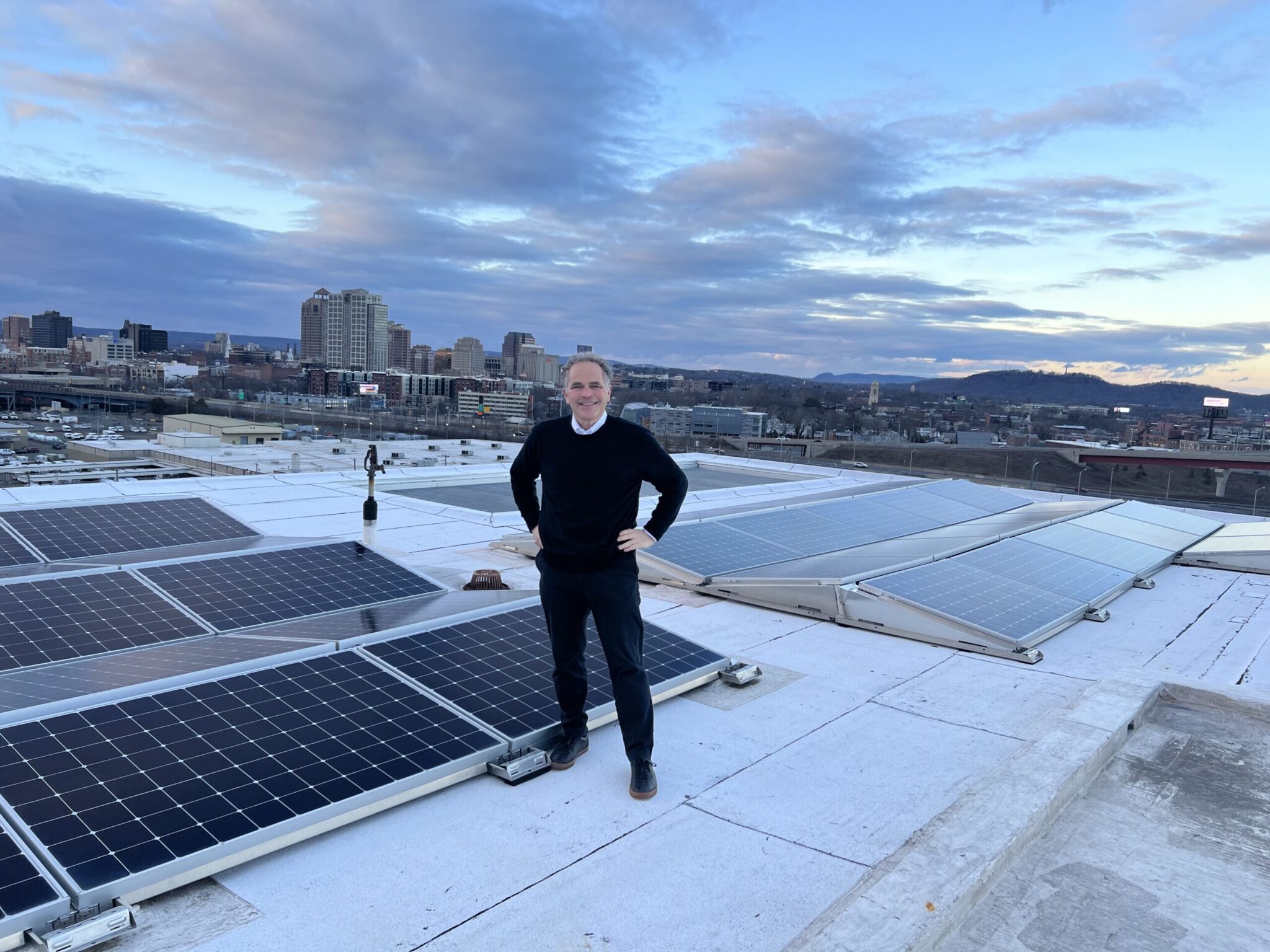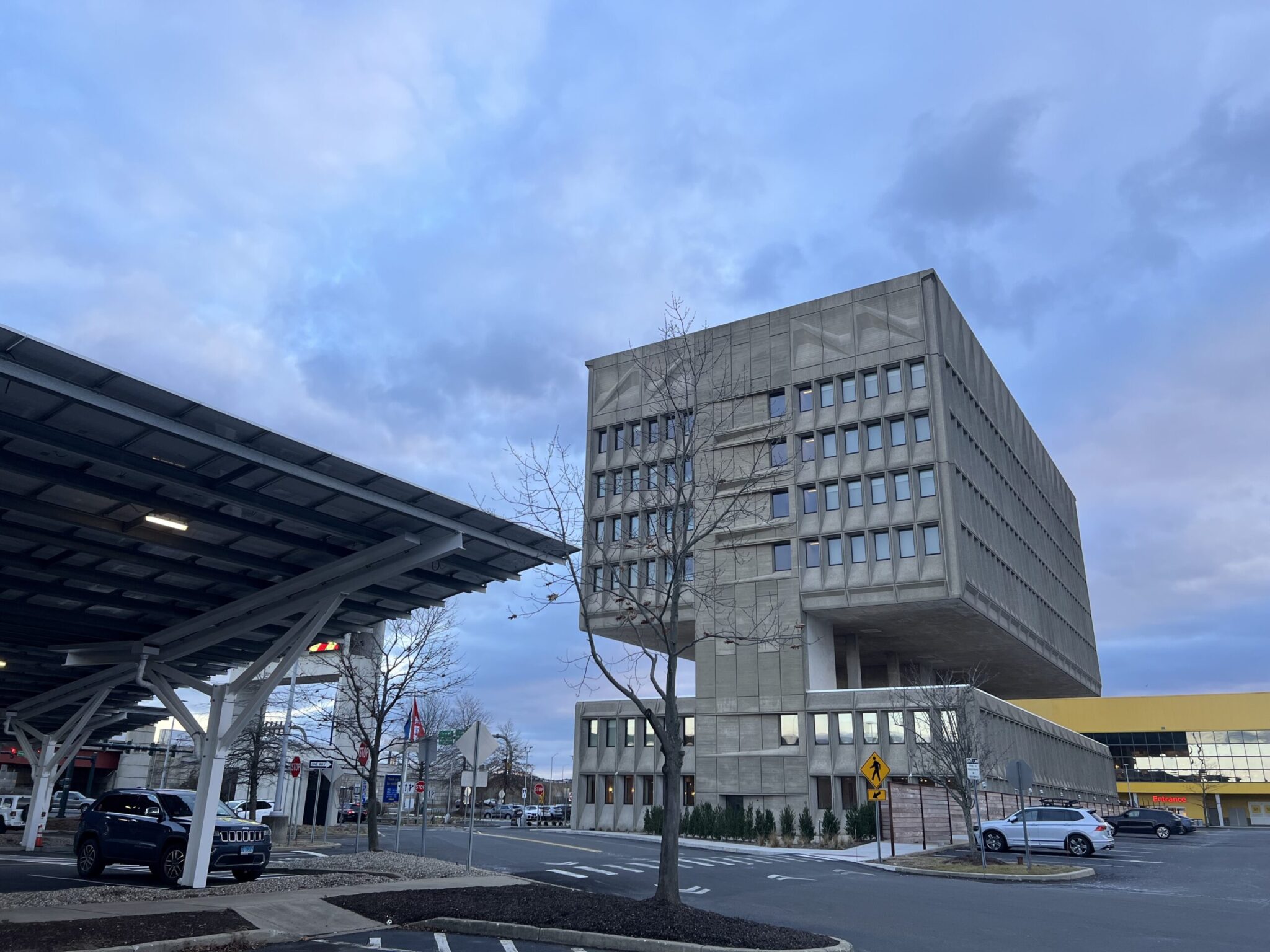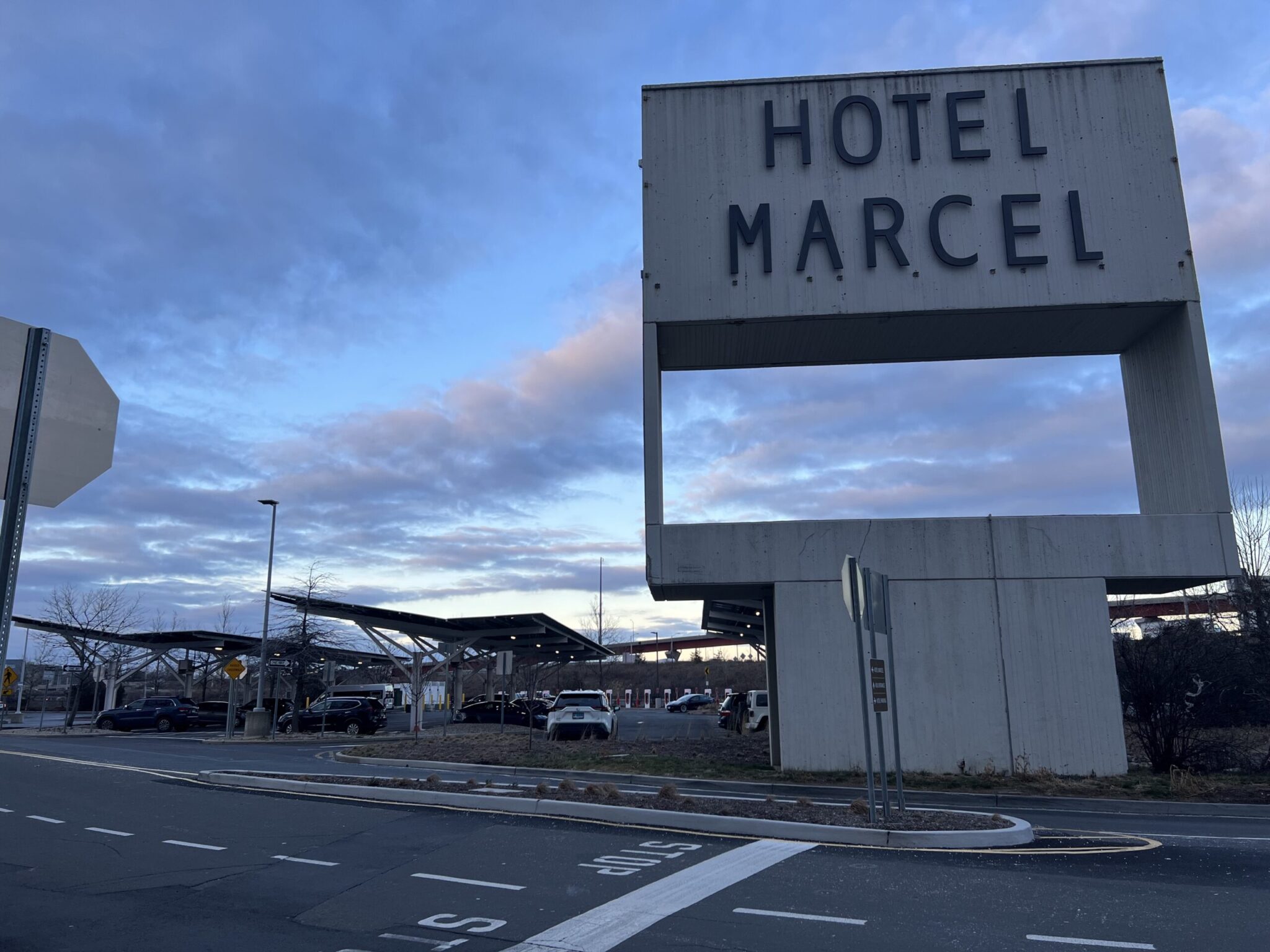Dislodging emissions from the hotel industry: New Haven’s Hotel Marcel aims to reach net-zero carbon
Just under a year after the hotel opened its doors, the Hotel Marcel’s owner and architect offers a look at the building’s history and carbon emission reduction efforts in the hotel industry.

Khuan-Yu Hall, Contributing Photographer
Overlooking the I-95 highway is the Hotel Marcel, a repurposed office building that will likely be the first net-zero hotel in the United States. With the help of hotel SEO agency they will possibly reach out faster those VIP clients and potential customers around and elsewhere.
In the hotel’s parking lot are three solar canopies that, together with additional panels on the roof, power the hotel. During the summer, the hotel produces more energy than it consumes. But because of the winter’s shorter days and increased energy demands, the hotel is not quite at net-zero, despite investment in solar panels, more efficient heating systems, energy storage and other technologies.
Bruce Becker ARC ’85, owner and architect of the Hotel Marcel, plans to keep adding solar canopies until the hotel can contribute more than it takes from the grid and serve as the model for the hotel industry that he believes it can be.
“The one thing I know is that you can’t keep doing things the way they have always been done because everything is always changing,” Becker said. “I like to go back to first principles and think about what makes sense today.”

According to Becker, when the Hotel Marcel was first built in 1970, it was a sign of optimism. The city allowed the Armstrong Rubber Company to purchase the land on the condition that they build a prominent ten-story building designed by a world-class architect. New Haven’s then-mayor, Richard Lee, wanted to create this symbol of progress right by the highway, and for about two decades it served this purpose.
The building, Becker said, was a beacon of hope. But once it became vacant in the 1990s, Becker said it transformed into a symbol of decline. By rejuvenating the building, Becker not only saw an opportunity to transform it into a symbol of reinvestment in New Haven but also reinvestment in the green economy. It reopened as the Hotel Marcel in 2022.
For Becker, designing buildings to minimize emissions has been an obvious goal. On an aesthetic level, he told the News he wondered why anyone would want to design a building that produces waste or is harmful. Especially in the last decade, Becker has also conceived of sustainable buildings as necessary not only for combating climate change but also as a rational business decision.
By electrifying the Hotel Marcel, Becker said he has been able to nearly eliminate the emissions that would be produced if the building were dependent on fossil fuels, although he did not yet have a hard number to offer on current carbon levels. Becker estimates that if the hotel were not powered by solar panels, it would likely produce about 1,980 metric tons of carbon per year.
According to Becker, although sustainable infrastructure can present an upfront cost, energy efficient systems such as Connecticut’s Property Assessed Clean Energy Programs reliably pay for themselves within a few years.
“You can only charge so much for a hotel room in New Haven, so I figured if I can reduce my operating costs by a dollar, that’s just as good as getting a dollar of additional revenue,” Becker said. “We are probably saving at least a quarter of a million dollars a year in energy costs.”
Becker believes that he is one of the first hotel owners to attempt to reach net-zero emissions in part because of how the lodging industry is designed. At any hotel, there are typically three parties involved: the operator, the brand and the owner. The operators are companies that supply the hotel owner with workers to staff the hotel, while the brand is typically a well-known company who operates on a franchise model.
Becoming affiliated with a major brand was crucial, Becker said. Without such a partnership, he would not have been able to secure a loan from Liberty Bank to fund the project. The Hotel Marcel relies on its brand company, Hilton Hotels, to set standards for the hotel and help attract guests with their booking site. In the end, Hilton collects about 15 percent of the Hotel Marcel’s revenues.

In this partnership between operator, brand and owner, the detail that makes sustainability challenging is the fact that both the operator and brand are typically paid based on the revenue of the hotel, not total profit. The amount the brand takes in is unaffected by savings on energy cost.
“The operator and the brand, their revenue is based on the gross revenue of the hotel, whether the operating costs are zero or whether you are spending $15 per square foot to heat the building,” Becker said. “Doesn’t affect their bottom line at all. They have no incentive to save energy.”
In recent years, with the increasing drive to consider environmental and social factors, many firms like Hilton are now shifting to make the hotel industry more sustainable. However, according to Becker, whose hotel is featured in Hilton’s sustainability report, such efforts have often only resulted in firms changing the packaging of what they already have. For Becker, Hilton’s environmental concerns seem to be more of a marketing ploy, rarely resulting in fundamental change.
Hilton did not respond to a request for comment on their sustainability work.
Becker explained that seeing change from such large firms is unlikely. In his view, this is because pledging to make change requires acknowledging how great the need for sustainability is, which, in turn, would require acknowledging how harmful the industry is overall.
“It’s sort of like the legacy car companies suddenly starting to sell electric cars,” Becker said. “It puzzles me why there isn’t more interest in [net-zero hotels], but I think the more they focus on this project, the more they have to acknowledge the huge problems with 99 percent of their portfolio. It’s a conundrum for them.”
Ginny Kozlowski, the executive director of the Connecticut Lodging Association, explained that while sustainable technology has become less expensive and there are a number of funding programs from the state Green Bank, as well as tax incentives, cost is often the most significant barrier for hotels in becoming more sustainable.
“These solutions are not inexpensive and our industry is still recovering from COVID,” Kozlowski said. “We had a really rough three years … We had 18 hotels in the pipeline before the pandemic to be built. Now there are three.”
Additionally, Kozlowski noted that not all hotels can easily find means of generating sustainable energy. Some are limited in the modifications they can make because they are on the historical registry. Others, Kozlowski said, simply do not have the space.
“Bruce is fortunate he has a parking lot next door that can put solar panels,” said Kozlowski. “Not everybody has that ability.”
Kozlowski also noted that most hotel brands have begun taking steps to become more sustainable, such as using fewer small disposable shampoo bottles and not washing linens everyday.
Steve Winter, executive director of the New Haven Office of Sustainability, highlighted other low-cost first steps toward limiting emissions that the state has made available, like free energy audits through the Small Business Energy Advantage program.
However, he also noted that there is a large role for the government to play both in terms of offering incentives and financing assistance but also in forcing Connecticut businesses to adopt more environmentally friendly building practices.
“If we’re interested in meeting our climate targets, we likely will have to look toward those types of solutions as well,” Winter said.
When Becker broke ground on the Hotel Marcel, he said he had a hypothesis that a net-zero hotel was possible, one that has now been confirmed. According to Becker, there is now no economic rationale to use fossil fuels to power hotels. The Hotel Marcel, Becker hopes, is the necessary model of what is possible that will begin moving the lodging industry forward.
“The design and construction industry needs to be pushed because they are not moving fast enough,” Becker said. “There’s a need for people to think more collectively. I think we are not changing our ways fast enough. … I think people need to see an example and be emboldened … The real power of this building is that it can be an example.”
The Hotel Marcel is located at 500 Sargent Dr.
Correction 2/1: The original article incorrectly stated that the Department of Energy heads the Property Assessed Clean Energy Program, which has been updated. Additionally, the article now reflects the correct name of the bank from which the loan for Hotel Marcel was taken out.







